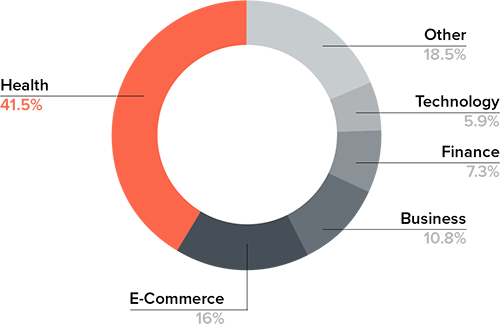Updated:
On August 1, 2018, Google introduced the “Medic” Update to their algorithm, hoping to ensure the safety of consumers by preventing fraudulent and low-reputation websites that offer high-repercussion services from getting search engine visibility. Google determined the value and relevance of web pages by using E.A.T. (Expertise, Authority, and Trust).
After this update, however, many legitimate, reputable websites were also negatively impacted. If your website has been losing traffic since last August despite legitimate content and SEO best practices, you might have been affected by the Medic Update.
Why Did the Medic Update Have Such a Big Impact?
Google is constantly updating its algorithm (approximately 500 times a year) and most of these updates have low impact. Far less frequently, Google makes a broad core update, like Medic, which is designed to fix a major flaw in search indexing. Last year, Google was focusing its attention on sites with YMYL (“Your Money or Your Life”) pages, which are defined as having long-lasting repercussions on the health, happiness, safety, and/or financial stability of users.
Who Was Most Affected by the Medic Update?
Health websites saw the largest impact from Medic (as the name implies), accounting for 41.5% of all categories. E-Commerce was next at 16%, followed by Business (10.8%), Finance (7.3%), and Technology (5.9%).
What Does Google Look for When Determining the Quality of a YMYL Site?
Here’s a quick breakdown of E.A.T. elements:
Expertise – This requires clear evidence that the person and/or company representing the website has knowledge, experience, and competence in their field.
Authority – This requires proof that the webpage author is an expert on the topic and is qualified to write about it. Items that help with authority include credentials, job title, bio, and relevant experience.
Trust – This requires evidence that the website itself is safe to visit. Websites can earn trust by obtaining an SSL certificate, using an HTTPS encryption, displaying visible contact information on page, and maintaining a good reputation.
How to Fix Your Website if it was Impacted by the Medic Update?
The YMYL Checklist below provides questions to consider when auditing your site. If you want to learn more about the Medic Update or how to recover your visibility, let us know and we’ll be happy to help.
- Do you have enough Main Content on your web pages?
There are three classifications for web page content: Main Content (MC), Supplementary Content (SC), and Advertisements/Monetizations (Ads). MC refers to any content that allows the page to achieve its purpose, whether the author or user creates it. MC needs to provide satisfactory content for the user and the amount needed is determined by the breadth of the topic. For example, a general page for a health condition such as “whiplash” would require a greater amount of information than a page that answers how long it takes for whiplash to go away. A general guideline to follow is to write content with a word count between 1,000 and 2,500 words. - Do your web pages directly show E.A.T. for their topics?
When writing content for a particular topic, it is important to show that you are qualified in that specific area. So, if you’re writing about child psychology, you need to demonstrate E.A.T. for that, even if you have expertise in other areas. - Is your reputation in line with the topic you are covering?
E.A.T. considers your online reputation. This is also tied to the subject matter, so having a good reputation in one area won’t necessarily help you establish E.A.T. in another. If neither you nor your business have an online reputation, Google won’t automatically rank your pages as low quality. However, if your reputation is negative, it will. One way to improve your online reputation is soliciting reviews from satisfied customers. - Does your site have pages that answer questions about your brand?
This would include an “About Us” page, “Why Us” page, “Contact” page, and any sort of customer services pages (e.g. FAQs, “Our Process”). To establish E.A.T., these pages need to answer potential questions. For example, the About Us page should have your team information, history, core values, awards/certifications, and social media links. - Do your web pages have high-quality Supplementary Content?
SC is any element on a web page that is not MC but helps with user experience. Common types of SC are ratings, navigation links, and checkboxes. SC should synchronize with and enhance MC. For example, a cooking time element on a recipe webpage lets the user know how long it takes to prepare the food item. Furthermore, SC should not distract from MC. - Is your web page set up in a way that allows users to easily find what they need?
If a web page covers several subtopics within a general topic, then subheadings should be used to help the user easily locate the subtopic. Also, related links should direct users to other pages on the site and a conversion link should be readily available. E-Commerce sites should include filters that help users find specific products. - Do you regularly maintain and update your website?
Google has always favored fresh content and this is still true after the Medic Update. To keep your website productive, it’s important to add new content, such as blog posts. It is also important to update existing pages (especially important for Health sites). - Are links to your Privacy Policy placed in your footer?
Privacy Policy pages include GDPR pages for all websites that solicit personal information and HIPAA pages for medical websites. By placing these links in the footer, you show Google that you and your company value the personal privacy and online safety of users. - Did you claim your Google My Business (GMB) profile?
Claiming this profile is crucial for establishing E.A.T. since Google indexes your business. It also builds trust with users. When claiming your GMB profile, it’s important to make sure that your name, address, and phone number (NAP) appear the same way they do on your website. - Are your social accounts linked to your website?
If they are, it will help build Trust. Social accounts include Google reviews, Twitter, Instagram, Facebook, and YouTube and links should be placed as icons in the header and footer of your website. It’s also important to remember that social media accounts are similar to your website in the sense that they need to be updated regularly to take full advantage of the Medic Update algorithm. - Are you soliciting positive reviews and testimonials?
As mentioned in Question #3, a positive reputation is important for establishing E.A.T. Testimonials and good reviews on your website (as well as any listing sites) can boost your company’s reputation and make search engines take notice. If you’ve received testimonials from your customers, be sure to place them on key pages of your site such as a landing page, sales pages, and contact pages. Also, consider implementing a dedicated testimonial page to your website. - Have you considered your personal brand?
If you are a key person in your business, it is important to build your personal brand and thereby demonstrate expertise in your field. The best method is to publish relevant and helpful content. You can also list your certifications and provide linkable logos of associated organizations. If you have an advanced degree, like a Ph.D, be sure to list it with your name. And if your name is used in off-site content related to your field, link to that content from the “news” or “press” page on your website.










